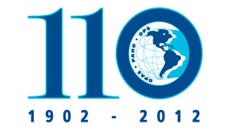 The Pan American Health Organization [PAHO] this week marks the 110th anniversary of its founding in 1902 as an international organization dedicated to protecting and advancing public health in the Americas.
The Pan American Health Organization [PAHO] this week marks the 110th anniversary of its founding in 1902 as an international organization dedicated to protecting and advancing public health in the Americas.
At 110, PAHO is the world’s oldest international public health agency. During its century-plus existence, it has catalysed Pan American cooperation that has contributed to such major regional health achievements as:
•A gain of 30 years in average life expectancy since 1902.
•The eradication of smallpox and poliomyelitis from the Americas.
•The elimination of endemic transmission of measles and rubella.
•Major reductions in infant mortality.
•Significant expansions of health coverage for poor and vulnerable populations in PAHO member countries.
“Today we celebrate the fact that the peoples of the Americas have a life expectancy that is three decades longer than it was 110 years ago, thanks to the vision and values of our forefathers and the tireless work of many generations of public health leaders in the Americas,” said PAHO Director Mirta Roses Periago during a celebration at the historic Willard Hotel, where the International Sanitary Bureau [PAHO’s precursor] was established on 2 December 1902. “Those, who gathered here 110 years ago, were visionaries. We have followed in their footsteps and we still have a long way to go.”
Representatives from Costa Rica, Guatemala, Mexico, the United States and Uruguay, five of PAHO’s 11 original founding countries, were among the guests at the anniversary event.
The U.S. Surgeon General, Regina Benjamin, quoted one of her predecessors, U.S. Surgeon General Walter Wyman, who served as PAHO’s first Director and who spoke at the 1902 founding convention-: “No subject could be more important to be discussed at this conference than the protection of people against disease, and ensuring that people live in an environment that puts them in a position to reach the highest levels of health.”
“These words ring true today as much as they did 110 years ago,” said Dr. Benjamin.
In the early years, Pan American health cooperation was focused on yellow fever and other infectious diseases that were being spread by the growing maritime commerce of the late 19th and early 20th centuries. Over the past 100 years, PAHO has kept its focus on improving health by promoting collaborative efforts among its member countries. Recent examples include Pan American action to address the rise of chronic non-communicable diseases, which helped spur the first United Nations High-Level Meeting on Non-communicable Diseases, held in New York in 2011.
Other regional public health achievements to which PAHO has contributed include:
•The establishment of Vaccination Week in the Americas, which celebrated its 10th year in 2012 and inspired the first World Immunization Week, also in 2012.
•The ratification by 29 of 35 countries in the Americas of the Framework Convention on Tobacco Control [FCTC].
•In Latin America and the Caribbean, the highest rates of coverage with antiretroviral treatment for people with HIV of any middle-lower-income region.
•In Latin America and the Caribbean, the lowest infant mortality rates of any developing region.
•Significant expansion of access to water and sanitation services, for both rural and urban populations.
“We are making fantastic progress by working together and thanks to our commitment to leave no country behind,” Dr. Roses told participants in the 110th anniversary event. “Our region’s strength lies in its capacity to bridge differences between countries with different economies and of different sizes, to unite and take the best action possible for the health of our peoples.”
Also as part of its 110th anniversary celebration, PAHO also hosted a panel discussion on health planning and gender equity, two longstanding areas of PAHO’s technical cooperation and leadership that have contributed to regional health progress.
Today, PAHO is a multilateral organization with 35 Member States from throughout the Americas. From its Washington, DC, USA headquarters and Country Offices throughout the Region, it provides technical cooperation in areas including epidemiology and outbreak response, health services organization and health planning, mental health, environmental health, health legislation, regulatory agencies, immunization, and many others.
As the Regional Office for the Americas of the World Health Organization [WHO], PAHO is a member of the United Nations System. It simultaneously serves as the specialized health agency of the Inter-American System, together with the Organization of American States [OAS] and the Inter-American Development Bank [IDB].

Disclaimer: The comments posted do not necessarily reflect the views of DominicaNewsOnline.com and its parent company or any individual staff member. All comments are posted subject to approval by DominicaNewsOnline.com. We never censor based on political or ideological points of view, but we do try to maintain a sensible balance between free speech and responsible moderating.
We will delete comments that:
See our full comment/user policy/agreement.